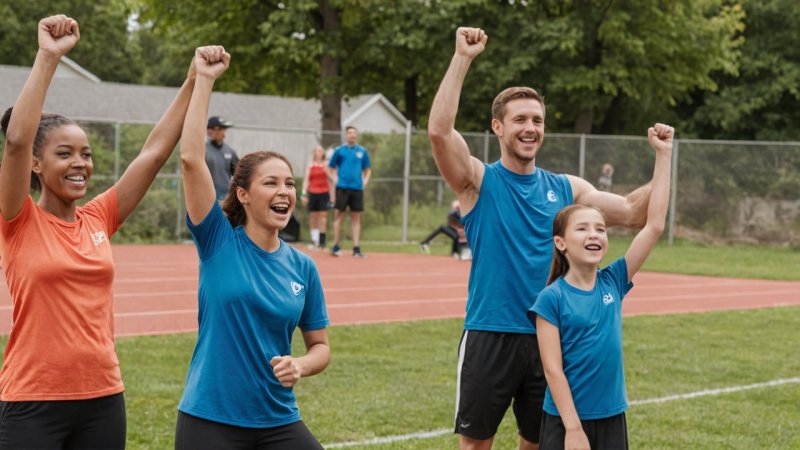In the journey of an athlete, the support system surrounding them plays an integral role in their development, performance, and overall well-being. Among the many influences that contribute to an athlete’s success, family support stands out as a fundamental pillar. Family members can provide emotional encouragement, logistical assistance, and a sense of belonging that fuels an athlete’s passion and commitment. This article delves into the various dimensions of how family support contributes to athletic training, particularly in enhancing performance and ensuring safety.
Emotional Support: The Cornerstone of Athletic Endeavors
Emotional support from family members can create a nurturing atmosphere that allows athletes to thrive. When family members express belief in an athlete's abilities, it fosters self-confidence and resilience. Athletes often face pressures from competitions, training regimens, and the desire to achieve their personal bests. During these challenging times, knowing that they have a supportive family can alleviate stress and anxiety.
For instance, parents who attend competitions and cheer on their children provide a morale boost that can positively impact performance. This emotional backing can encourage athletes to push their limits, knowing they have a safety net in the form of family support. Furthermore, family members can help athletes process their experiences, celebrate successes, and navigate disappointments, which is crucial for their mental health and motivation.
Logistical Support: Facilitating Training and Competition
Family involvement often extends beyond emotional encouragement to practical support during training and competitions. This logistical assistance can include driving athletes to practices, managing their schedules, and ensuring they have the necessary equipment and nutrition. Such support is invaluable, especially for young athletes who may not yet have the means to manage these responsibilities independently.
For example, a family that prioritizes an athlete's training can help with meal planning to ensure healthy nutrition, or they might take turns carpooling with other families to reduce travel stress. Additionally, family support may come in the form of helping athletes adhere to training regimens by keeping them accountable and motivated. This collaborative environment allows athletes to focus on their performance without being overwhelmed by the logistics of their sport.
Creating a Healthy Balance: Sports and Family Life
While it’s essential for athletes to dedicate time to their training, it’s equally important that they maintain a balance between sports and family life. Family members can help cultivate this balance by encouraging athletes to engage in family activities and fostering connections outside of their sport. This holistic approach can prevent burnout and keep athletes motivated over the long term.
Families can plan recreational activities that don’t necessarily revolve around sports, allowing athletes to unwind and recharge. Whether it’s a family outing, movie night, or a simple dinner together, these moments can strengthen familial bonds and serve as a reminder that while sports are important, they are part of a more extensive life experience.
Safety First: The Role of Family in Promoting Safe Practices
Safety is a critical aspect of athletic training that should never be overlooked. Family members play a vital role in promoting safe practices and encouraging athletes to prioritize their well-being. From ensuring that athletes wear proper protective gear to advocating for rest and recovery, families are often the first line of defense against injuries.
For instance, parents can educate their children about the importance of wearing helmets and other protective equipment in sports like cycling and football. They can also instill the understanding that overtraining can lead to injuries, emphasizing the need for adequate rest and recovery periods. By fostering a culture of safety, families contribute to long-term athletic success and help athletes develop healthy habits that will serve them throughout their careers.
Inspiration and Role Models: Family as a Source of Motivation
Family members often serve as role models for young athletes, inspiring them to pursue their goals with determination. Whether it’s a sibling who excels in sports or a parent who has a background in athletics, these figures can motivate athletes to emulate their dedication and hard work. Sharing personal stories of perseverance can create a powerful narrative that encourages athletes to strive for greatness.
Furthermore, families can expose athletes to various sports and activities, broadening their horizons and helping them discover their passions. By engaging in sports together as a family, they can cultivate a love for physical activity and a sense of camaraderie that enhances the athletic experience.
Conclusion: The Lasting Impact of Family Support on Athletic Training
In conclusion, the role of family support in athletic training is multifaceted, encompassing emotional encouragement, logistical assistance, safety advocacy, and motivational inspiration. Families not only provide a stable support system that allows athletes to thrive but also contribute to their overall well-being and development. For athletes, knowing that their loved ones are cheering them on, helping with logistics, promoting safety, and serving as role models can create a profound sense of commitment and passion for their sport. Ultimately, family support is a crucial ingredient in the recipe for athletic success, fostering an environment where athletes can pursue their dreams while maintaining their health and safety.






